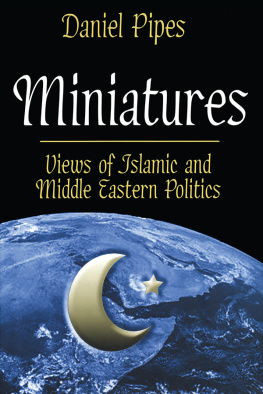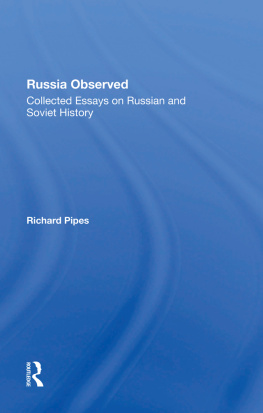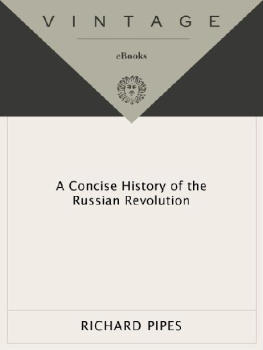Daniel Pipes - The Meaning of History
Here you can read online Daniel Pipes - The Meaning of History full text of the book (entire story) in english for free. Download pdf and epub, get meaning, cover and reviews about this ebook. year: 2017, publisher: Taylor and Francis, genre: Science. Description of the work, (preface) as well as reviews are available. Best literature library LitArk.com created for fans of good reading and offers a wide selection of genres:
Romance novel
Science fiction
Adventure
Detective
Science
History
Home and family
Prose
Art
Politics
Computer
Non-fiction
Religion
Business
Children
Humor
Choose a favorite category and find really read worthwhile books. Enjoy immersion in the world of imagination, feel the emotions of the characters or learn something new for yourself, make an fascinating discovery.
- Book:The Meaning of History
- Author:
- Publisher:Taylor and Francis
- Genre:
- Year:2017
- Rating:3 / 5
- Favourites:Add to favourites
- Your mark:
- 60
- 1
- 2
- 3
- 4
- 5
The Meaning of History: summary, description and annotation
We offer to read an annotation, description, summary or preface (depends on what the author of the book "The Meaning of History" wrote himself). If you haven't found the necessary information about the book — write in the comments, we will try to find it.
The Meaning of History — read online for free the complete book (whole text) full work
Below is the text of the book, divided by pages. System saving the place of the last page read, allows you to conveniently read the book "The Meaning of History" online for free, without having to search again every time where you left off. Put a bookmark, and you can go to the page where you finished reading at any time.
Font size:
Interval:
Bookmark:

The Meaning of History
With a new introduction by Maria Nemcova Banerjee
Nikolai Berdyaev

Originally published in 1936 by Geoffrey Bles. Introduction first published in Modern Age, Summer 2004.
Published 2006 by Transaction Publishers
Published 2017 by Routledge
2 Park Square, Milton Park, Abingdon, Oxon OX14 4RN
711 Third Avenue, New York, NY 10017, USA
Routledge is an imprint of the Taylor & Francis Group, an informa business
New material this edition copyright 2006 by Taylor & Francis.
All rights reserved. No part of this book may be reprinted or reproduced or utilised in any form or by any electronic, mechanical, or other means, now known or hereafter invented, including photocopying and recording, or in any information storage or retrieval system, without permission in writing from the publishers.
Notice:
Product or corporate names may be trademarks or registered trademarks, and are used only for identification and explanation without intent to infringe.
Library of Congress Catalog Number: 2005055994
Library of Congress Cataloging-in-Publication
Berdiaev, Nikolai, 1874-1948.
[Smysl istorii. English] (Black classics of social science)
The meaning of history / Nikolai Boerdyaev ; with a new introduction by
Maria Nemcova Banerjee.
p. cm.
Originally published: London : G. Bles, 1936. With new introd.
Includes bibliographical references.
ISBN 1-4128-0497-3 (alk. paper)
1. HistoryPhilosophy. 2. ChristianityPhilosophy. I. Title.
D16.8B326 2006
901dc22
2005055994
ISBN 13: 978-1-4128-0497-4 (pbk)
V ictory over death-bearing time has been the fundamental theme of my life, says Berdyaev in the introduction to his Spiritual Autobiography. Composed during the last decade of his life, this retrospective narrative is, like everything that Berdyaev wrote, an essay in philosophical meditation. In his conception, memory is much more than the faculty of passive recollection. Instead, the act of remembrance seizes up the meaning of the lived past in a moment of creative vitality, assessing it in the urgency of a consciousness in contact with the eternal.
Born in an aristocratic family in Kiev, Nikolai Berdyaev (1874-1948) lived through the cataclysmic events of the first half of a century whose aftershocks still haunt us. Witness to two world wars, he observed the destruction of established cultures in the traumatic birth of new worlds, having experienced three Russian revolutions from close-up. Four times arrested on political suspicion, first by the Imperial and then by the Bolshevik police, he died an exile after years of intense intellectual activity, at a philosophical distance from actuality. He was never more than a curious but unwelcome guest in history. He fearlessly engaged it on the level of ideas while remaining alien to its means and ends, gifted with an incurable longing for transcendence.
The awareness of a spiritual realm beyond the mundane bustle of existence came early to Berdyaev. Characteristically, he first apprehended it in the dialectical moment of negation, as the pain of a lack. The sense of having fallen into an inferior world was more familiar to me, is how he puts it. He admits to being unable to recall an experience of religious conversion, when the void of spirit was suddenly made full. But he singles out one ecstatic, soaring instant of transformation, which he marks as the initiation into his lifelong philosophical quest for spiritual freedom:
I remember a momentit was summer in the countryI found myself in the garden, at the hour of twilight and my heart was heavy.... Under the clouds, night was growing thicker, but suddenly a light surged inside me. I do not call this moment a conversion, because I was in no way a sceptic before that, nor a materialist, or an atheist, not even an agnosticand because even afterwards, my inner contradictions persisted; the perfection of inner peace did not follow from it and the anguish caused by complex religious problems did not cease. To give a true picture of my spiritual path, I must insist on freedom, as the origin and the end of my religious life.
In biographical retrospect, Berdyaevs intellectual trajectory seems marked by a recurrent pattern of withdrawal from an established mode of being, a rupture followed by a surge of creativity. At the age of twenty, his mental exit from the aristocratic world of his family tradition was linked to his first encounter with Marxism. It was a philosophical worldview he would revisit critically at various points in his career.
But even in his youthful enthusiasm, he was not convinced by the systematic exposition of dialectical materialism as such. Rather, he responded to the winds of freedom he sensed blowing in the revolutionary lan of the Social Democrats he met. He was in tune with the cosmopolitan outlook of their intellectual exponents, many of whom were Jewish. And instinctively, he shared their opposition to capitalism, which he associated with the dead weight of bourgeois culture.
While insisting on social justice for the oppressed classes, Berdyaev maintained that a political revolution could at best bring only an incomplete liberation. Precocious and exceptionally well read, the twenty-year-old thinker understood that matter and all that pertains to it is essentially conservative. In debating the materialistic theses of Marxism within the Social Democratic gatherings in Kiev, he was taking on the impossible task of grafting spiritual sight onto the blind, toiling, still subterranean mole of history.
Berdyaevs withdrawal from the arena of politics coincided with his move to St. Petersburg in the summer of 1904. There he plunged into the dionysiac whirl of the Russian Silver Age and its rich literary culture. He became familiar with the leading personalities of Russian Symbolism, visionary poets like Alexander Blok, Andrei Bely, and Viacheslav Ivanov, who propounded the doctrine of theurgic art. But of all of them, he was most fascinated by the originality and the verbal power of the essayist Vasili Rozanov. And yet, the latters conception of Christ as a lunar being who had made the fruits of this world taste bitter, was alien to him.
Soon enough Berdyaev would feel oppressed by the overwrought sensuality of the artistic milieu. He grew tired of the febrile discussions of Christianity and the impending apocalypse, which had first drawn him to the salon of Zinaida Gippius and Dmitri Merezhkovsky. Having initiated the series of lectures at the Philosophical-Religious Society with the topic Christ and the World, he gave up as futile the project of reconciling the Petersburg cultural elite with the more open-minded representatives of the Orthodox Church. For his part, he went on to explore the deep roots of Russian messianism by keeping company with a variety of God-Seekers among the common people.
The failure of the Revolution of 1905, with the pathos of roused but ill-led masses, moved Berdyaev to the quick. That debacle led him and other disenchanted intellectuals to a crisis of consciousness that culminated with the publication of Vekhi (Landmarks) in 1909. Berdyaev and his friend, Sergei Bulgakov, with whom he had collaborated in publishing the philosophical and religious reviews Novyi Put (The New Path) and Voprosy Zhizni (Life Questions
Font size:
Interval:
Bookmark:
Similar books «The Meaning of History»
Look at similar books to The Meaning of History. We have selected literature similar in name and meaning in the hope of providing readers with more options to find new, interesting, not yet read works.
Discussion, reviews of the book The Meaning of History and just readers' own opinions. Leave your comments, write what you think about the work, its meaning or the main characters. Specify what exactly you liked and what you didn't like, and why you think so.









